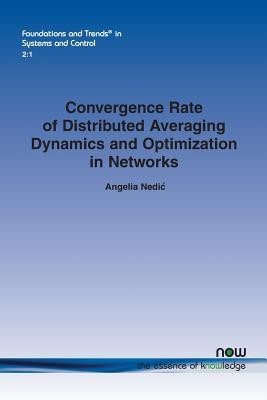
- We will send in 10–14 business days.
- Author: Angelia Nedic
- Publisher: Now Publishers
- ISBN-10: 1680830406
- ISBN-13: 9781680830408
- Format: 15.6 x 23.4 x 0.6 cm, softcover
- Language: English
- SAVE -10% with code: EXTRA
Convergence Rate of Distributed Averaging Dynamics and Optimization in Networks (e-book) (used book) | bookbook.eu
Reviews
Description
Recent years have seen the advent of new large cyber-physical systems such as sensor and social networks. These network systems are typically spatially distributed over a large area and may consists of hundreds of agents in smart-sensor networks to millions of agents in social networks. As such, they do not possess a central coordinator or a central point for access to the complete system information. This lack of central entity makes the traditional (centralized) optimization and control techniques inapplicable, thus necessitating the development of new distributed computational models and algorithms to support efficient operations over such networks. This tutorial provides an overview of the convergence rate of distributed algorithms for coordination and its relevance to optimization in a system of autonomous agents embedded in a communication network, where each agent is aware of (and can communicate with) its local neighbors only. The focus is on distributed averaging dynamics for consensus problems and its role in consensus-based gradient methods for convex optimization problems, where the network objective function is separable across the constituent agents. The tutorial will be of interest to researchers and engineers working on a wide-variety of operations research, networking and optimization problems.
EXTRA 10 % discount with code: EXTRA
The promotion ends in 20d.15:32:43
The discount code is valid when purchasing from 10 €. Discounts do not stack.
- Author: Angelia Nedic
- Publisher: Now Publishers
- ISBN-10: 1680830406
- ISBN-13: 9781680830408
- Format: 15.6 x 23.4 x 0.6 cm, softcover
- Language: English English
Recent years have seen the advent of new large cyber-physical systems such as sensor and social networks. These network systems are typically spatially distributed over a large area and may consists of hundreds of agents in smart-sensor networks to millions of agents in social networks. As such, they do not possess a central coordinator or a central point for access to the complete system information. This lack of central entity makes the traditional (centralized) optimization and control techniques inapplicable, thus necessitating the development of new distributed computational models and algorithms to support efficient operations over such networks. This tutorial provides an overview of the convergence rate of distributed algorithms for coordination and its relevance to optimization in a system of autonomous agents embedded in a communication network, where each agent is aware of (and can communicate with) its local neighbors only. The focus is on distributed averaging dynamics for consensus problems and its role in consensus-based gradient methods for convex optimization problems, where the network objective function is separable across the constituent agents. The tutorial will be of interest to researchers and engineers working on a wide-variety of operations research, networking and optimization problems.


Reviews